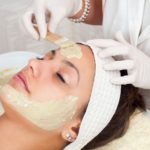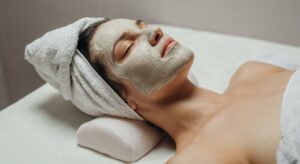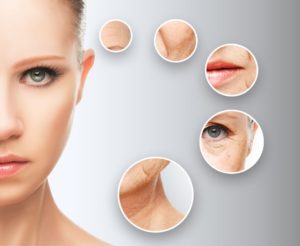As the season changes from the harsh winter to the rejuvenating spring, it’s essential to adapt your skincare routine accordingly. Here are five spring-specific skincare tips to help you maintain a healthy and radiant complexion.
1. Exfoliate
Exfoliate your skin to remove the buildup of dead skin cells and reveal a fresher, smoother surface. Regular exfoliation can improve skin texture and help brightening products penetrate better. There are several ways to exfoliate your skin, and it’s important to choose the method that’s best suited for your skin type and needs. Here are some popular methods of exfoliating your skin:
- Mechanical Exfoliation: This method uses tools or physical scrubbing agents to remove dead skin cells. Examples include a facial scrub, exfoliating brush and a Microdermabrasion treatment
- Chemical Exfoliation: This method uses acids or enzymes to break down the bonds between dead skin cells, making them easier to remove. Examples include Alpha-hydroxy acids (AHAs), Beta-hydroxy acids (BHAs) and Enzymatic exfoliants.
- At-home peels: Many companies offer at-home peel kits that contain a higher concentration of exfoliating agents to provide similar effects to professional peels. Follow the instructions carefully and do a patch test first to make sure your skin can tolerate the peel.
No matter which method you choose be sure to be gentle though as over-exfoliating can damage your skin, causing irritation and redness. Be sure to always use gentle pressure and adjust the frequency of your exfoliation routine based on your skin’s needs. Additionally, be sure to moisturize after exfoliating. Your skin may be more sensitive and will need extra hydration. Use a nourishing moisturizer to lock in moisture and protect your skin’s natural barrier.
2. Adjust your moisturizer
Adjusting your moisturizer to a lighter formula can be a good practice this spring. During the dry winter months heavy creams are more common and even essential but they can feel too greasy in warmer weather. Opt for a lightweight, oil-free moisturizer to keep your skin hydrated without clogging your pores.
3. Remember your sunscreen!
Be sure to start applying sunscreen daily – even when it doesn’t seem too sunny outside. Sun damage can happen year-round, and it’s vital to protect your skin with a broad-spectrum sunscreen of at least SPF 30. Even on cloudy or cool days, harmful UV rays can still penetrate through clouds. Sun damage can lead to premature aging, sunburn, and an increased risk of skin cancer.
Sometime sunscreen can be a bit cumbersome so there are other options that can protect your skin as the sun starts to heat up.
- Wear protective clothing: Choose long-sleeved shirts, long pants or skirts, and wide-brimmed hats to cover your skin from the sun. Opt for clothing made of tightly-woven fabrics to provide better protection against UV rays.
- Seek shade: Stay in the shade, especially during peak sun hours, which are usually between 10 a.m. and 4 p.m. Just being mindful to stay out of the direct sunlight when there is some shade nearby can be a bit help.
- Wear sunglasses: While these won’t really help protect your skin, protecting your eyes isn’t something that should be ignored. Choose sunglasses that block 100% of both UVA and UVB rays to protect your eyes from sun damage and reduce the risk of cataracts.
4. Add antioxidants to your skincare routine
Antioxidants like the ones in like Vitamin C or green tea are essential components to include in your skincare routine, as they help neutralize harmful free radicals caused by environmental stressors like pollution, UV radiation, and smoking. By neutralizing these free radicals, antioxidants can reduce inflammation, prevent premature aging signs, and promote overall skin health.
Here are some effective ways to add antioxidants to your skincare routine:
- Choose products that contain antioxidant ingredients: Look for skincare products, such as serums, creams, and sunscreens, which are formulated with powerful antioxidants like Vitamin C, green tea extract, resveratrol, and Vitamin E.
- Use a green tea-infused moisturizer: Green tea extract is rich in polyphenols, a powerful antioxidant that can help reduce inflammation and protect your skin from sun damage. Incorporating a green tea-infused moisturizer into your routine can help keep your skin hydrated and protected throughout the day.
- Apply antioxidant-rich sunscreen: For bonus points in following point #3, some sunscreens are formulated with antioxidants to provide extra protection against free radicals. Look for sunscreens that contain antioxidants like Vitamin C, Vitamin E, or green tea extract to shield your skin from harmful UV rays and environmental pollutants. This way you can handle 2 of these tips at the same time.
- Include antioxidant-rich foods in your diet: A healthy diet can also improve your skin health. Consume antioxidant-rich foods like berries, spinach, kale, and nuts to provide your body with the essential nutrients it needs to fight oxidative stress.
- Consider antioxidant supplements: If you believe you aren’t getting enough antioxidants in your diet, consult with a healthcare professional about antioxidant supplements, such as Vitamin C or E, to help support your skin’s defenses against environmental stressors.
5. Don’t forget the importance of proper hydration.
Drinking plenty of water and incorporating hydrating ingredients like hyaluronic acid into your skincare regimen can improve your skin’s elasticity and overall appearance.
*Information in this article is not medical advice and may not be factually accurate. It is intended for entertainment purposes only. Consult with a physician before attempting any tips in this blog post and to get the most up to date factual data about any procedure or treatment.














